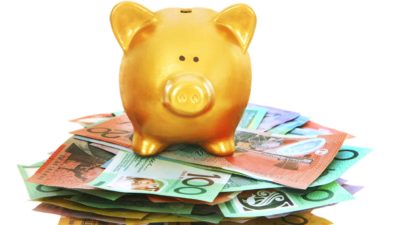Oh man.
I can't remember the last time I was so unhappy about being right.
To be fair, I don't do predictions, usually. Trying to guess the zigs and zags of the market is a game that belongs in Sideshow Alley, not the preserve of finance types.
Still, I was horrified — and said so — about the Federal Government's policy to 'help' people by letting us raid up to $20,000 of our Super.
It was — and remains — a woefully conceived and implemented policy, which was always going to have the effect of costing people hundreds of thousands in retirement.
And yes, some of the people involved did need help (let's put aside the thousands who took out their Super without meeting the eligibility criteria, and who could have to pay it back. Plus interest. Plus a fine).
No, that's not even close to the worst of it.
People who needed a financial bridge to get through COVID-19 were encouraged by the government to dip into their retirement savings.
Meanwhile, billions and billions and billions of dollars were being thrown around like confetti.
Airlines? Here's $700m.
JobKeeper? Have $130 billion. Or $60 billion… who can know?
I could go on. If you have a pulse, you get cash. Well, except for one specific case.
You're an individual under financial stress? Can't help you. Not enough money.
Sorry, you'll have to go poor(er) in retirement, instead.
Which, if your ideology stretches to that point, is one thing.
But compared to the generational public debt being racked up for everything else?
Well, it's hard to see how the response isn't apples and oranges.
That much was able to be foreseen (except, it turns out, by the government).
What I didn't foresee, at least to the extent that it happened, is the absolute disaster it's turned into.
Apparently motorbike sales are through the roof. So, if you believe the news, are plastic surgery and tattoos.
Just the sort of thing Super is supposed to be there for, right?
Then, this morning, news from IndustrySuper, via Effie Zahos:
"According to @IndustrySuper 560k Aussies have wiped out their super funds. At least 460k of them are under the age of 35…"
Half a million people.
Now with no Super.
Bloody hell.
If you don't think this is a massive issue, I'll respectfully suggest you don't understand it well enough.
I spend much of my professional life trying to tell people to make sure they don't take risks that lead them back to Square One.
You'll almost certainly never make it back again, given the biggest influence on your retirement nest egg is likely to be not returns, or even fees.
It's 'time'.
Because money you have at 35 has three decades to compound between then and retirement.
And if you can leave it longer (while you spend other money, including future contributions), that initial nest egg might actually compound into your 70s or 80s.
Imagine that. 5 decades of compounding.
Gone.
Because the government thought that you weren't important enough to include in the cash splash, and that your 3, 4 or 5 decades of compounding at 6, 8 or 10% wasn't worth the government borrowing a few more dollars at less than 1%..
It beggars belief.
Speaking of which, the gold price hit a record high in the US overnight.
Which is both a huge surprise and totally expected.
Huh?
Well, gold has traditionally — almost always — risen in times of uncertainty and fear. The reasons aren't easy to explain — it tends to be a self-fulfilling prophecy more than anything.
I mean why gold, rather than anything else?
Probably, despite all of the earnest rationale expressed by commentators, simply because it's become an article of faith.
Once people believe that gold will go up in times of fear they buy… because gold goes up in times of fear. Which — and you're probably ahead of me already — pushes the price up!
As I said, a self-fulfilling prophecy.
What's strange, this time, is that while gold is hitting record highs, so is the US stock market. And while we're not hitting the same highs, the ASX is up some 35% since the March lows.
Shares and gold are usually yin and yang — one falling while the other rises.
To have them both rise at the same time is very unusual. It seems investing — like much of public life — is polarised. One group of people believing that owning shares, pre-recovery, is getting ahead of the curve. Another group is pretty sure things are either going to get worse, or stay bad for a while, so they're buying gold.
It's possible they're both right, but that's a pretty small gap to put a battleship through.
Me?
Well, I'm a shares guy.
And shares have trounced gold over the long term, cyclical swings notwithstanding.
You'd be pretty gutsy to expect gold to win over the long term from here, too.
Indeed, while shares tend to set new highs and keep climbing (with plenty of down periods, too), selling gold at or near a peak tends to be a smart strategy, given that it's much more cyclical than the stock market, writ large.
Or, put another way: do you really want to buy a cyclical commodity at the very time when it's at a cyclical high?
I didn't think so.
I have no idea what happens to shares or gold in the short to medium term. No-one else does either.
Over the long term, though, I'll be incredibly surprised if gold wins.
As Warren Buffett wrote a couple of years ago:
"Those who regularly preach doom because of government budget deficits (as I regularly did myself for many years) might note that our country's national debt has increased roughly 400-fold during the last of my 77-year periods. That's 40,000%! Suppose you had foreseen this increase and panicked at the prospect of runaway deficits and a worthless currency. To "protect" yourself, you might have eschewed stocks and opted instead to buy 3 1⁄4 ounces of gold with your $114.75.
And what would that supposed protection have delivered? You would now have an asset worth about $4,200, less than 1% of what would have been realized from a simple unmanaged investment in American business."
Yeah, I'm with Warren.
Which doesn't mean things can't be wonky for a while. As I said, I don't have a short term prediction.
But as with most cyclical things, it's better to buy at the bottom (even if people are freaking out) and sell at (or near) the top, even if that's precisely when all of the news is positive.
Which leads me nicely to earnings season, which has just kicked off in earnest.
This is going to be one of the stranger ones for a while.
We all know things are going to be subdued. But, whereas many businesses are usually relatively predictable beasts, COVID has turned our expectations on their heads.
Earnings season is always better called 'expectations season', because share prices move not based on whether earnings were 'good' or 'bad', but whether those earnings were better or worse than the market expected.
(Which is why you can see profits fall 90% and a share price rise, or profits double and shares fall!)
But this year, the range of potential outcomes is just massive — even for the most usually-pedestrian businesses.
Expect lots of volatility over the next 5 weeks. Lots of it.
And, as ever, make sure you look through these current earnings. Share prices should reflect a company's total earnings, from here to eternity — not just the impact of the last, or next, six months.
If the market over-reacts — in either direction — the savvy (read: capital-F Foolish) investor will be presented with an opportunity.
Make sure you're emotionally and financially ready to pounce.
We are.
Fool on!








